How much should I be paid? Is $X a good salary for us? Should I switch jobs for $X?
These are questions I get asked all the time on social media, and honestly, I used to ask myself these things too.

Me when I get these questions
So, let’s dive into these questions using a theory I totally made up. 😜
Understanding Your Salary
Let’s face it—aside from HR, no one really knows how salaries work. But I’m going to try to break it down using the basics of economics that I know.
Now, I’m no economics guru, so if you need one, go check out Brad Cartwright’s courses.
Imagine you work for a company that sells a Good (product) called X. What you bring to the table is called Labor. Your labor is essential for creating X.
When the company sells X, it keeps a portion, pays off the intermediaries (because intermediaries are everywhere and always get a cut 😫), and whatever’s left is your salary.
See, salaries are super easy to understand, right? 😛
Oh, by the way, this is a incomplete super-simplified version of what’s known in Economis as the circular flow of income model.
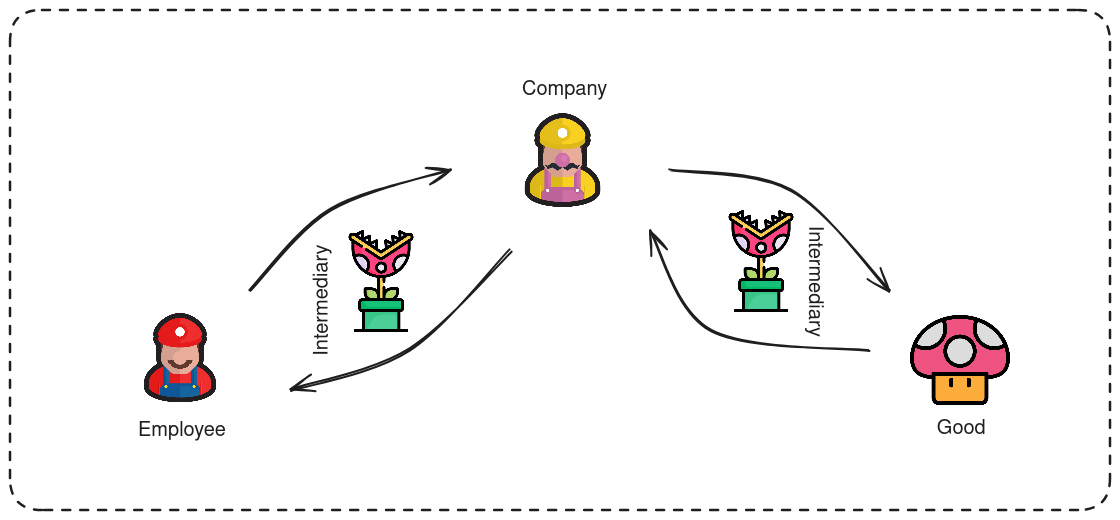
Half baked circular flow of income
The Golden Rule
We’re not even halfway through this post, and I’m already giving you the golden rule. Aren’t I generous?
The golden rule is: The absolute value of your labor equals the value of the final product your labor help create.
Now, don’t get too excited, you’re never going to see the full value of your labor in your paycheck. The company and those pesky intermediaries are going to take their share for all their hard work. So in other words:
What you earn + What the company earns + intermediaries share = How much does the good costs

The value equation
From now on, let’s use these terms instead:
- Salary = What you earn
- Company’s Share = What the company earns
- Intermediaries’ Cut = What intermediaries get
- Absolute Value = The cost of Good X
How Does Absolute Value Change?
Since absolute value is tied to the final product, it’s ruled by the same boring economic principles, primarily the law of supply and demand. This explains a lot of what we see happening every day:
- In good times, companies give out annual raises because inflation pushes up the prices of final goods, meaning employees’ absolute value increases.
- In bad times, companies lay people off because the demand for final goods drops, lowering the absolute value of the employees who produce them.

FROSD
So, how do you boost your absolute value? Just follow the FROSD, or the F*cking, sorry I mean the Fine Rule of Supply and Demand. If you’re contributing to a product with high demand and low supply, guess what? According to the FROSD, that product has more value, and so do you!
- Example 1: The final product is PRs for an ancient Cobol codebase. Demand for these PRs is sky-high because many businesses still rely on Cobol in production, but the supply of Cobol expertise is tiny. That’s why Cobol engineers get paid so well.
- Example 2: The final product is design docs for a big streaming service that can handle Millions of requests. These docs cannot be found anywhere, If you have the idea of building the next Netflix, you better pay good for these. 😉
- Example 3: The final product is CRUD app features in a language/framework taught at every school in a specific country. Sure, demand might be high for these, but so is the supply. So yeah, don’t expect huge salaries.
- Example 4: The final product is an AI application using cutting-edge LLMs and GPTs that no one’s heard of yet. Demand is high for these things nowadays, so you can expect a sweet Absolute Value.
Lastly, because it’s tied to the final product, your Absolute Value can also be influenced by factors like location, government regulations, and other stuff.
Enough with the Absolute Value BS, How Do I Get a Higher Salary?
First things first! Just because you have a big Absolute Value doesn’t mean you’ll automatically get a big salary. Remember the equation:
Salary = Absolute Value - (Company’s Share + Intermediaries’ Cut)
Even if your Absolute Value is high, the company might be taking too much of it, or intermediaries might be eating up more than their fair share (looking at you, taxes). Or both!
Let’s peek inside the loop -aka the job market- which also follows the FROSD. With the same Absolute Value, you can boost your salary by either shrinking the company’s share or cutting down the intermediaries’ slice.
Again, remember that golden rule?
Salary = Absolute Value - (Company’s Share + Intermediaries’ Cut)
Even if you’re still cranking out the same PRs (and the final product is holding steady in value), you might be able to negociate a higher salary by reducing the company’s cut of your overall Absolute Value.
That’s what we call a Salary Increase if you stay put or Changing Jobs for More Money if you switch gigs.
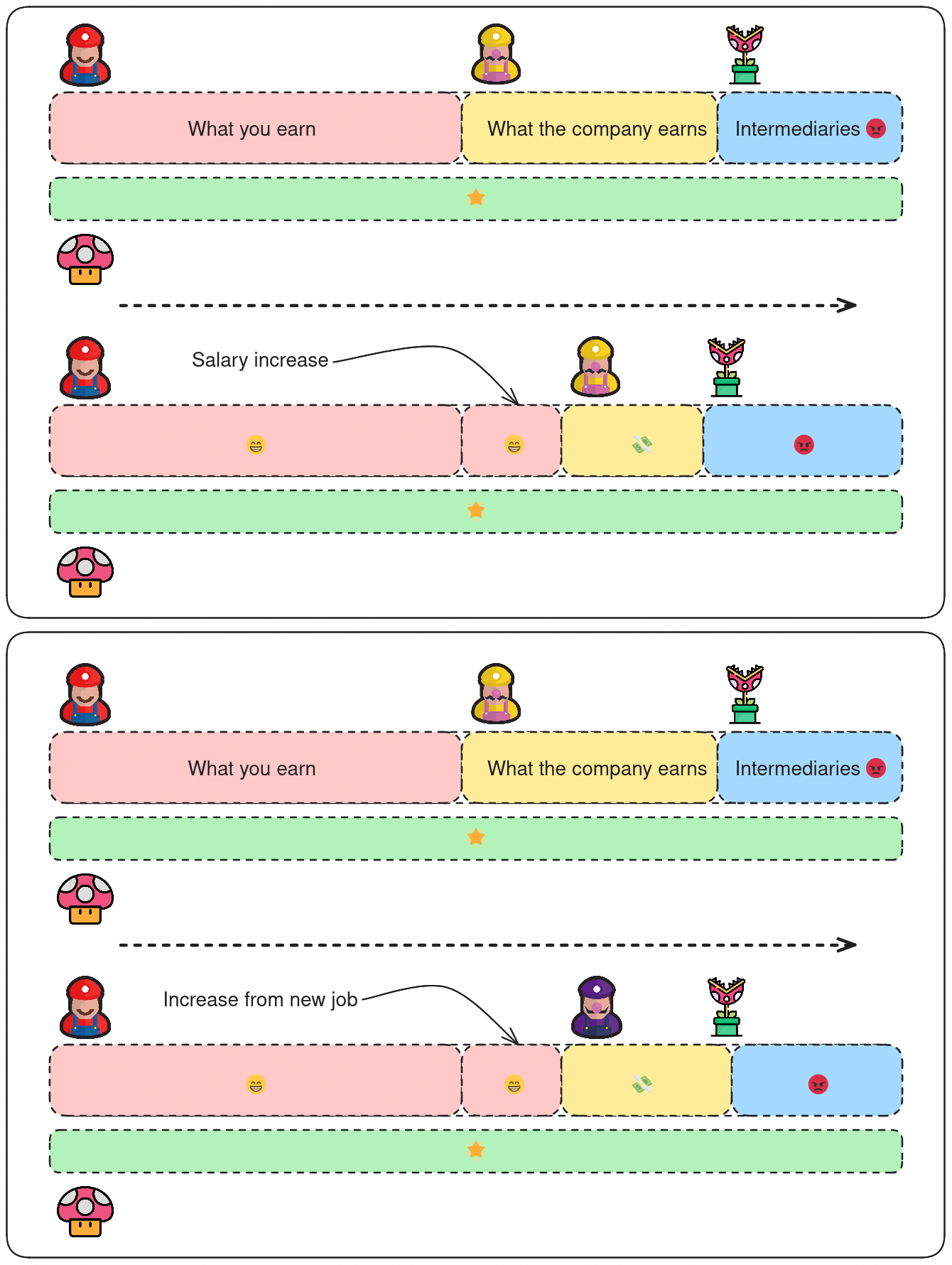
Salary increase
Alternatively, you can keep the company’s share steady but reduce the intermediaries’ take. There are various ways to do this, some legal, some not-so-legal, depending on the intermediaries involved (just a heads-up, tax evasion is illegal 😂).
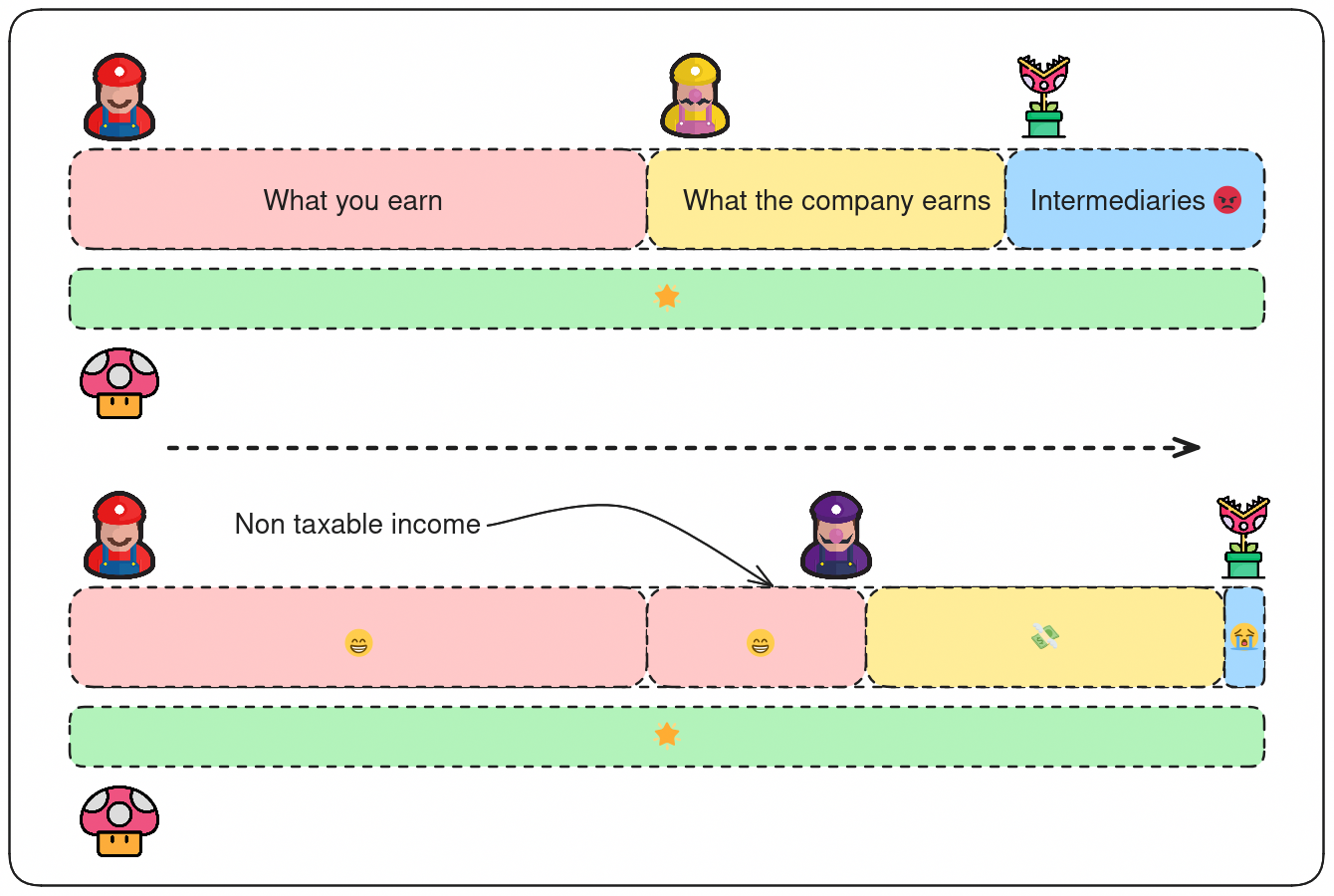
Tax Evasion
One last thing before we dive in: in the job market, when everyone’s Absolute Value is the same, your labor becomes the product that’s subject to the FROSD. If your skills are in short supply but high demand, you can cash in big time.
I get it, this stuff can be a bit mind-boggling. But picture this:
you’re a Java developer who can write CRUD Spring Boot APIs, and your max Absolute Value is set at MAX$. The hiring company plans to take X$ off the top. Now, if you’re the only Java wizard in town and everyone wants your magic, the company might be willing to cut some dollars off their X$ cut (or pull some their tax tricks 🤨) to offer you a sweeter salary. (Remember the good old Covid days 🥹)
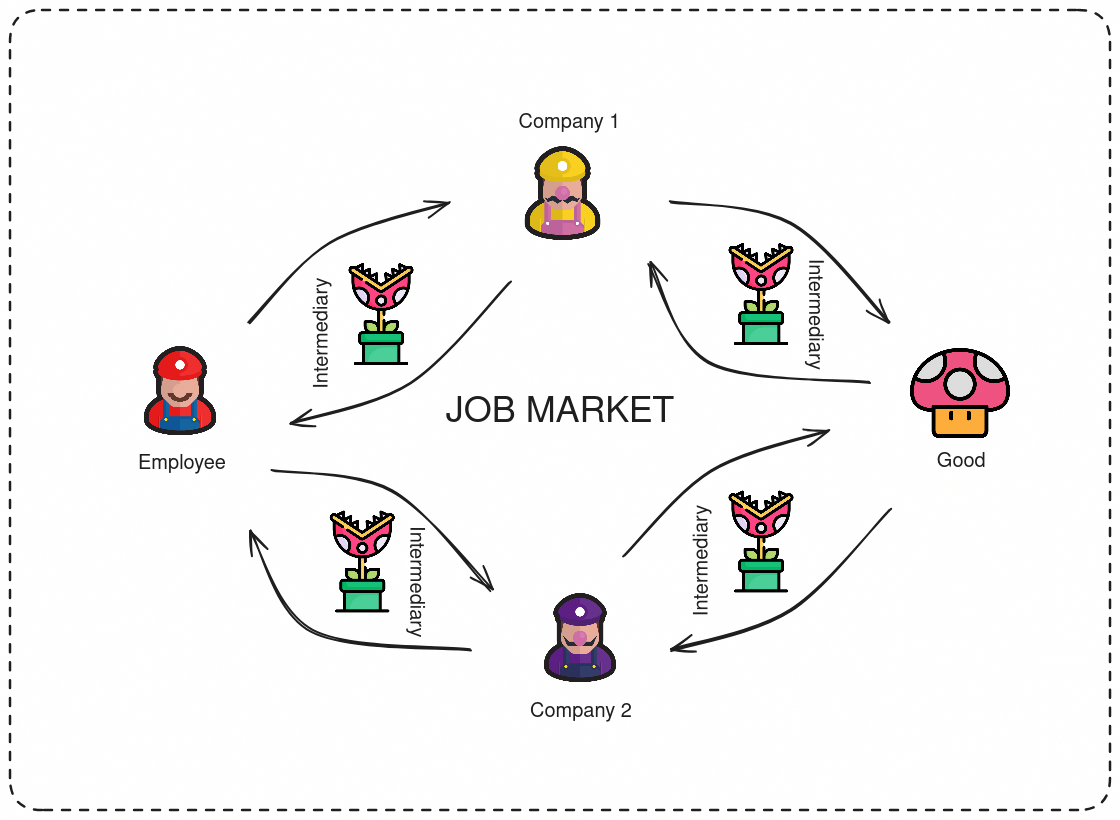
Job Market - High Demand for Talent
Now flip the script. Let’s say you and a group of Zig experts are hanging out in a place where only one company is trying to do something cool with Zik like building their own build system (see what I did there?). You’re all going to have some hard times trying to get that job. Tough luck, right? Once again, blame it on that damned FROSD.
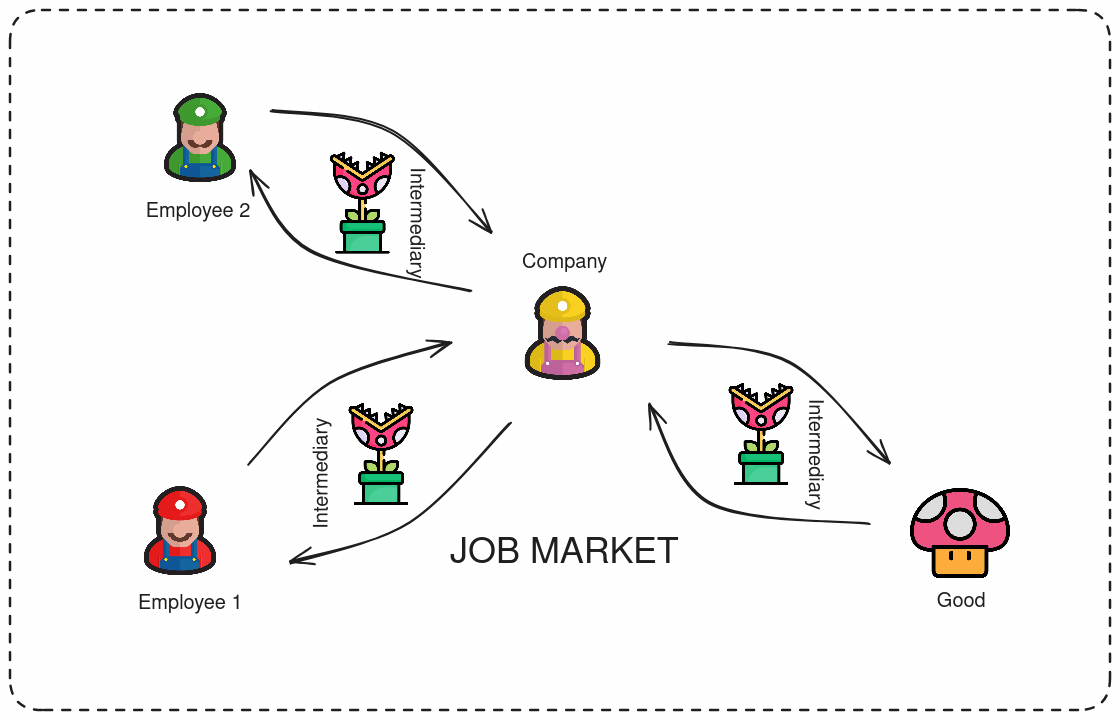
Job Market - High Supply of Talent
Always the FROSD when negociating a new salary (unless the odds are against you).
The Real Golden Rule
Okay, I am sorry lied to you. The golden rule I gave earlier isn’t the real golden rule. This one is:
Always boost your Absolute Value! And keep the value proportions balanced.
Wait, that’s two rules right?! Sorry! While it’s nice to have a high salary, it’s even better to have a big Absolute Value. Plus, you’ll want to ensure the company (and those intermediaries) also make some money from your labor so they’re happy to keep you around.
To wrap things up, here are two examples of unbalanced value equations you should steer clear of:
- The Mary’s Case:
- Mary started working for a low salary, doing basic tasks every day.
- She never learned anything new beyond what was needed for his job.
- Mary hopped jobs a few times, getting small raises each time.
- Now, Mary’s Firable: he has a relatively high salary, but his work isn’t that valuable to the company.
- Mary is also Unhireable: no one wants to pay him a high salary for the basic tasks he knows.
- Don’t be like Mary.

Mary’s Case
- The Barry Case:
- Barry worked in his country for a few years.
- He made a deal with his employer to get paid under the table, avoiding taxes.
- Barry isn’t a good citizen according to the government.
- Don’t be like Barry (and if you are, don’t get caught 😂).

Barry’s Case
- Hamid’s case
- Hamid is working for a company for 2 years
- Hamid is a Python ninja, we wrote the entire backend for the company and he’s helping the data science team debugging their problems.
- Hamid is learning so much everyday
- Hamid has never gotten a raise since he joined
- Hamid is working in his cave and no one knows what Hamid is capable outside of work.
- Don’t be like Hamid

Hamid’s case
- The Bob’s Case
- Bob has been working for a company for 3 years now.
- Bob got his salary increase 2 times now.
- Bob stopped learning new thing and he working on the same stuff over and over.
- Bob’s tasks can be done by Mary who was hired last year.
- Bob can’t understand why he’s not getting a raise.
- Don’t be like bob
Now that you’ve got the scoop on how salaries work, get outta here! Don’t ever ask me about this again! Salaries are just another way capitalism keeps us in check and makes life miserable. I’m packing up and heading to the wilderness. OR NOT… 🤔
Thank you for reading, See you in the next one!